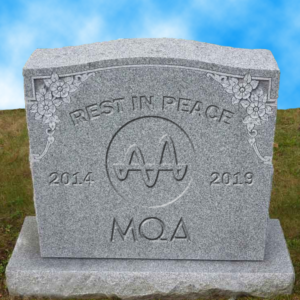Maybe I’m the first to say it. But let’s face it: That lossy digital audio codec known as MQA is dead.
 Sure, the pundits will point to streaming MQA titles on Tidal.
Sure, the pundits will point to streaming MQA titles on Tidal.
And that’s all fine and dandy, until you realize that Qobuz is coming out of beta on February 14th and offers true lossless high-res streaming up to 24-bit, 192kHz. Qobuz has already been the “official” streaming service at a few audio shows, and is doing the same at AXPONA this year. Not only that, Qobuz fired a direct shot across Tidal’s bow by having Roon support right out of the gate.
Will audiophiles leave Tidal in droves? Maybe. Maybe not. But an appreciable number of them will. And given Tidal’s past financial troubles, and the perception of being an also-ran among the Spotify users of the world (“what’s a Tidal?”), it may not take much to push them over the precipice of failure. (Or ripe for acquisition, by a corporation looking more at dollar signs than “those crazy audiophiles.”)
Many will hang onto MQA for only one single reason–they spent a small fortune on compatible hardware just to play it back. They can’t justify their purchase of “just another DAC” any other way.
Let’s also consider MQA CDs. A lame concept right from the beginning. The discs have stiffed! Many were purchased by curiosity seekers, and many ended up for sale rather quickly. MQA obviously did not take a lesson from HDCD’s failure. Another format the music buying public was apathetic about. Essentially the sound quality of CD-resolution is compromised in order to take advantage of MQA’s lossy encoding.
The public did not ask for HDCDs. Nor MQA CDs. Which are essentially HDCD 2.0.
MQA already has a lot going against it. Apparently not even its creators can give us a clear explanation of what it does. Rather, we get “white-paper-speak.” In essence, a lot of technobabble that makes sense only to its creators, intended to baffle everyone else who asks. Plus, we keep hearing of so many things that MQA does, or promises, as we go along–it is at the point where I don’t think even its creators know what it does anymore.
MQA. Master Quality Authenticated. It turns out that there is nothing “authenticated” about its “masters.” “Quality” is debatable–it’s a better lossy format than MP3, but it’s still a lossy format. Call it some ridiculous name like unfolding but…it is still a lossy format. Only now, depending on what you play it on, you get different levels of lossy. Don’t forget it also does some magical “deblurring” or whatever they call it–essentially, using DSP to tamper further with the original sonics of the recording.
Nice. Why not add a smiley-face EQ and maximize it while you’re at it?
What was laughable a short time ago was how the high-end press were gaslighting us. Of course it was us, the consumers who didn’t understand MQA. “We” didn’t get it. “We” couldn’t hear its many benefits. But, we mistrusted their motives for publishing what amounts to propaganda. Why were they so eager to shove this down our throats? That remains unanswered.
What they also failed to point out was that MQA was a licensing scheme, on many levels (equipment manufacturers, labels, etc.). Not only that, it offered a back-door scheme to enable DRM (digital rights management). This appeases the record companies to make them embrace MQA, but even the hint of DRM turns off consumers who learn it may affect the music the purchase.
So OK, right. What about us, the consumers? Most audiophiles that I know personally distrust MQA. Few ever hear any improvement; most hear no improvement at all. Others have found that MQA really is just a lossy codec which barely resolves to a level above CD, not to mention having DSP (digital signal processings) to perform some vague “deblurring” that is questionable at best. And some report the MQA-processed signal to be very slightly louder. This itself can be deceptive–it has long been proven that given a comparison between two sound samples, listeners will usually choose the louder of the two samples as sounding “better.”
Others feel it’s a money grab by a company that failed to make its last compression technology a household item. (That was MLP–Meridian Lossless Packing, which was used on DVD-Audio discs, which of course have now died a slow and painful death themselves. MQA is essentially a spinoff of Meridian; if they did one thing right, they’ve planned for the eventual failure of MQA by separating it from Meridian.) What a great way to sell more hardware! Oh, and all that licensing income can’t be hurting them either.
So, where does that leave us?
Qobuz is blazing the path of true high-res music streaming. Many will leave Tidal for Qobuz. The discs have flopped. Why buy lossy MQA CDs when you can download true high-res files from several places online now? There will be audiophiles who hang onto MQA, most likely because they purchased expensive equipment to play it back on. But that will not sustain a dead format.
The bottom line? Nobody asked for MQA. Nobody needs it or particularly wants it. It was an answer to a question nobody asked. While it arguably wasn’t stillborn, it had lived a short, miserable existence.
Time to order the headstone. RIP, MQA.